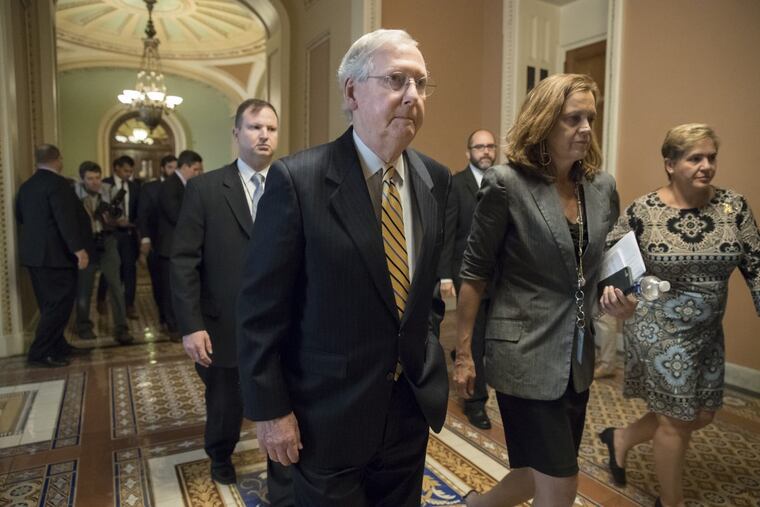Wish list for Congress, Trump's tax reform: Philly's small businesses want relief
We polled local investors, accountants, and tax lawyers to find out what they'd like to see in Congress' and Trump's tax reform package, due out the week of Sept. 25.

Congress may surprise us with a tax-reform blueprint the week of Sept. 25, so we polled local investors, accountants, and tax lawyers to find out what they'd like to see in the package.
Most folks we talked to expect few details from the Senate and House group known as the "Big Six." The group's members are U.S. Rep. Kevin Brady (R., Texas), Senate Finance Committee Chairman Orrin Hatch (R., Utah), Senate Majority Leader Mitch McConnell (R., Ky.), House Speaker Paul Ryan (R., Wis.), Treasury Secretary Steven Mnuchin, and White House economic adviser Gary Cohn.
First, they want the all-important corporate tax rate cut from the top-tier 35 percent to something in the 20s, which would apply to many small businesses in Philly, as well.
"It's still a moving target. Mr. Trump said this week that the rich would not gain from his tax-reform plan. That's certainly different from the one-page initial proposal, which had a low-rate tax on pass-through entity income," said Ronald M. Wiener, a tax lawyer and special consultant at Drucker & Scaccetti.
Even if "service company" income earned by businesses such as doctors and lawyers were excluded from this rate, Wiener said, "it could result in substantial tax reductions for owners of profitable businesses" in partnership form, who, by the way, include Trump and his family.
Mark Carrow, of the accounting firm Citrin Cooperman, wants to see repeal of the 3.8 percent net investment tax funding the Affordable Care Act and permanent passage of the 100-percent bonus depreciation. Does he expect anything concrete to come of Sept. 25?
"No," he said.
Tim Speiss, partner in charge of EisnerAmper's personal-wealth advisory group, said flatly, "No one really knows what will come out of this. We are of the view that on the individual side, there will be 10, 25, and 35 percent tax rates. The corporate tax rate could fall to as low as 15 percent, putting us in line with other industrialized nations. There's also talk of making the tax changes retroactive to Jan. 1, 2017, which would be a boon to the economy."
For investors, the good news is "corporate tax cuts are not in the market today," said Tim Riddle, CEO of Chartwell Investment Partners in Berwyn, which manages $8 billion. A subsidiary of TriState Capital Holdings, Chartwell last week renamed its Berwyn Cornerstone Fund as Chartwell Mid Cap Value Fund (BERCX).
Tracy Maeter, global investment specialist with J.P. Morgan Private Bank in Philadelphia, said the firm's expectation is that "if we get, say, a corporate rate down to 25 percent, we could see another 6 to 8 percent return on the S&P 500. If we get repatriation as well, perhaps another 1 to 2 percent."
Investors should watch what her firm calls a "deregulation basket" of stocks, including many financial, auto, and energy names, and a "tax reform" basket including companies with higher effective tax rates, such as retail and small-cap stocks.
Equifax in Pennsylvania
About 5.5 million Pennsylvanians are affected by the Equifax hack, according to state Banking & Securities Secretary Robin L. Wiessmann.
When consumers apply for credit cards, bank accounts, or loans, lenders rely on credit-score information supplied by Equifax and the other two major credit-reporting agencies, Experian and TransUnion. The Equifax data of 143 million Americans may have been compromised, including names, Social Security numbers, birthdates, addresses, and even driver's license numbers and credit-card numbers.
"People's identities can be stolen, their bank accounts can be drained, and their credit can be ruined by criminals in distant lands over the course of weeks, months, or even years," Wiessmann said in a statement.
For more information, to determine whether your personal data have been compromised, and to sign up for credit-file monitoring and ID theft protection, go to www.equifaxsecurity2017.com.
You can also call the credit-reporting agencies: Experian (1-888-397-3742), Equifax (866-447-7559), and TransUnion (1-888-909-8872). Note: You may have to pay a fee for freezing your credit or for a credit-monitoring service.
Contact the Federal Trade Commission's Identity Theft hotline at 1-877-438-4338 or visit www.identitytheft.gov. You likely will have to file a police report locally.
Department of Banking & Securities spokesman Ed Novak and many others (including yours truly) have contacted Equifax and other credit bureaus. He said he personally was ready to pay about $10 a month for Equifax credit monitoring.
"They were going to charge me, and then subsequently, they waived the fees," he said, so ask for a fee waiver if you call the bureaus.